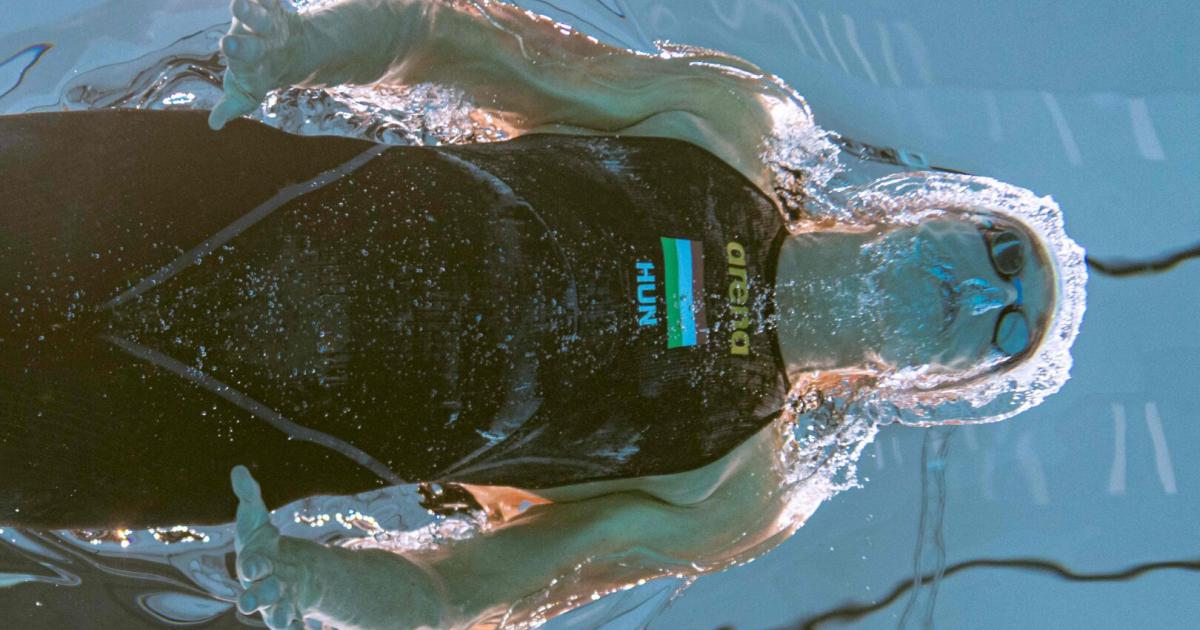If today in Budapest Duna-Arena die Short Course World Championships starts and hundreds of athletes jump into the 25-meter pool, it will be a unique experience for many.
Even if it is “only” the short train, thousands of enthusiastic visitors are expected here every day. For Hungary, a swimming competition is an absolute highlight. The fact that Hungarian athletes are always at the top of the world is not only a reason for this, but also a consequence of it.
With 10 million citizens, Hungary has about the same number of inhabitants as Austria – and is constantly producing top swimmers. András Hargitay is still an idol decades after his success, Katinka Hosszú has dominated the swimming world until recently, Kristóf Milák holds world and European records, just like Hosszú.
The KURIER asked Austria’s elite trainer Balázs Fehérvári why Hungary has been one of the top swimming nations for years. He came to Austria from his home country of Hungary ten years ago in order to bring athletes to top rankings here too.
“Tradition, infrastructure, audience, very strong coaches,” says Fehérvári. It starts with parents naturally going to the bathroom with their small children – “all of them”.
The tradition
A swimming course over a short period of time won’t solve the problem. If the child can master the basics of swimming, they will be taken to the technique course. “What skiing is to Austria, swimming is to Hungary,” explains the coach. “For the government, sport is a priority,” says Fehérvári.
What skiing is to Austria, swimming is to Hungary
Trainer ETC
This can also be seen in the distribution of funds for Olympic medals. “You can buy a small apartment with a gold medal,” which also happens in other countries, said the coach.
Hungary is very proud of its athletes, Katinka Hosszú told KURIER at the European Championships in Rome 2022, when she was about to win the 100th medal at a major event. “If you win an Olympic medal, you get a lifelong pension,” said the superstar. With one Gold medal you can get the Hungarian one Average income after the end of her career for the rest of her life, said Hosszú, who won three gold medals and one silver medal at the Olympics. “The association also supports the athletes very well. Training camps, monthly support and so on. We have a good system. Maybe we don’t earn as much as footballers, but it’s ok,” laughed the star swimmer, who has since retired. The most important thing is that the top athletes don’t have to work part-time and can concentrate fully on training.”
You can read how financial support for top swimmers in Austria works here:
Perhaps the tradition lies in the fact that the very first Hungarian Olympic gold medal, 1896 in Athenwas won in swimming,” speculates Coach Fehérvári. Since then, the small inland country has been at the forefront of major events. At the Paris Games, Hungary was fifth in the medal table behind major countries such as the USA, Australia, France and Canada. In Rio they were even the third best nation.
The infrastructure
None of this would be possible without the second pillar of swimming in Hungary mentioned by Fehérvári: the infrastructure. When Balázs Fehérvári came to Austria from Hungary ten years ago, it must have seemed like a developing country to him. Alone in Budapest there are half a dozen Indoor swimming pools with 50 m poolsaround 20 throughout Hungary.
There is also a 50 m outdoor swimming pool in the historic Szechenyi Spa in Budapest
In Austria there are just five. The one in the Südstadt, where Fehérvári trains his protégés, the one in the Wiener Stadthalle, in the Stadionbad, in Linz and in Graz. (And at least two trains in Salzburg). “There is a hall in every major city in Hungary.” Those children who do not have an indoor swimming pool nearby are picked up by bus. A project that is… Austrian Swimming Association OSV can also be presented in Austria.
The trainers
The third pillar of success is the trainers themselves. They are “really good,” says Fehérvári. All swimming coaches in Hungary have one University diploma. The knowledge and experience are huge. Being a coach at big clubs is a thing in Hungary Full time jobthat is different in many places in Austria.
The audience
The fourth pillar of success is the one that you can experience first hand at the World Cup in Budapest: the audience. The atmosphere in the stadium at the 2017 World Cup in Budapest The swimmers were so enthusiastic that some immediately suggested that from now on every World Championship should be held there. In 2022 we crawled there again, again this year. And in 2027 the swimming world champions will be determined again in Budapest.
Prelims
Tuesday: 50 m Delfin (Bucher, Edl), 200 m medley (Kreundl)
Wednesday: 100 m freestyle (Berger, Gigler), 100 m breaststroke (Reitshammer)
Thursday: 50 m backstroke (Bucher), 200 m delfin (Rizek), 100 m individual medley (Kreundl), 100 m individual medley (Gigler, Reitshammer)
Freitag: 200 m Brust (Rothbauer), 100 m Delfin (Berger), 100 m Delfin (Bucher)
Saturday: 50 m crawl (Kreundl), 50 m crawl (Gigler), 50 m breaststroke (Gigler, Reitshammer)
Sunday: 200 m freestyle (Berger), 200m freestyle (Trampitsch), 200m backstroke (Berger), 4 x 100m individual medley (OSV relay)
